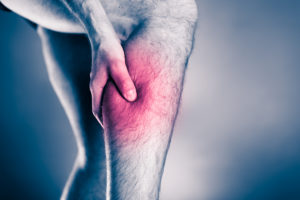For the past month I’ve been experiencing muscle cramps at night. Always in my calf muscles. And to the  point where some nights I wake up several times. Usually having to get out of bed to stretch and try to relax my calf muscle so that I can go back to bed.
point where some nights I wake up several times. Usually having to get out of bed to stretch and try to relax my calf muscle so that I can go back to bed.
Because of this I decided to research this area of muscle cramps at night and found that I’m not alone.
Most people experience an occasional muscle cramp. But as we age they become more common. It’s estimated that for people over the age of 60 (I’m 64) one out of three people experience muscle cramps at night. And if your over the age of 80 then the number of people experiencing muscle cramps at night increases to 50 percent.
Now my background and education is exercise physiology. So I assumed that the cause of my muscle cramps at night was a lack of potassium in my diet. But as I researched this issue I found that it’s more than just a lack of potassium.
Physiology of Muscle Cramps at Night
First let’s define muscle cramp and then look at the physiology of what is occurring.
For this article a “muscle cramp” would be when the calf muscle completely contracts and will not relax without some type of applied force let stretching or a massage. It’s a very painful experience and can last seconds to several minutes depending upon the severity of the contraction.
As I reviewed my exercise physiology training it reminded me that the contraction and relaxation of a muscle is dependent on four key minerals:
Calcium (Ca)
Sodium (Na)
Magnesium (Mg)
Potassium (K)
Sodium is needed for a muscle to contract and potassium is needed for a muscle to relax.
However, calcium and magnesium are critical to the start of each phase. Calcium is needed to initiate the uptake of sodium to cause your muscle to constrict. Magnesium is needed to initiate the uptake of potassium to cause your muscle to relax.
Most people never have to worry about having enough calcium and sodium in their diet. And the reason why is that your bones will always supply any needed calcium even if your diet is low in this area. And we get plenty of sodium from the foods we eat.
This means that the two key minerals are magnesium and potassium. And it’s estimated that close to 80 percent of Americans are deficient in their magnesium intake.
Magnesium and Potassium Play a Role in Muscle Cramps at Night
The importance of magnesium has often been ignored. But with the recent research in the microbime, the importance of magnesium is taking on a whole new perspective.
Researchers have detected 3,751 magnesium-binding sites for human proteins. And they have found more than 300 different enzymes that utilize magnesium to help detoxify your body and protect it from environmental chemicals, toxins, and heavy metals. Now when you combine this with the traditional understanding of how magnesium is:
Needed for muscle relaxation
Needed for nerve conduction
Needed for the creation of energy by activating adenosine triphosphate (ATP)
Needed for RNA and DNA synthesis
Needed for key neurotransmitters like serotonin
Needed by the enzymes of your microbiome to help digest proteins, fats, and carbohydrates
you can see how important this mineral is to your health. According to the government the RDA (recommended daily allowance) for magnesium and potassium is:
Magnesium RDA for men is 400 mg per day
Magnesium RDA for women is 310 mg per day
Potassium RDA for adults is 4700 mg per day
And if you’re active, then the need for these two minerals increases. In my next blog post I’ll provide you with several good natural food sources for these two minerals in helping you prevent muscle spams at night.
Leave a Reply
You must be logged in to post a comment.